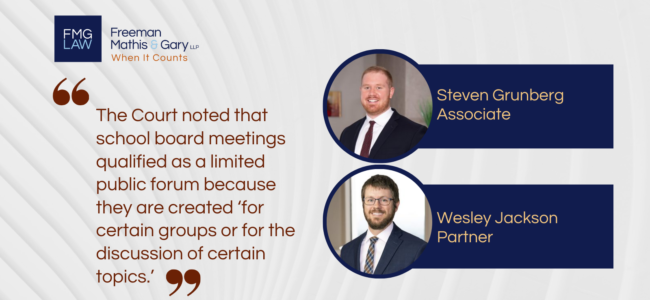BlogLine
Striking a balance: Eleventh Circuit provides clarity on restricted speech in limited public forums
10/21/24

By: Steven L. Grunberg and Wesley C. Jackson
On October 8, 2024, the Eleventh Circuit held that a Florida public school board overstepped its power to restrict speech during public comment periods at board meetings by implementing “inconsistent,” “muddled,” and “unreasonable” policies. Moms for Liberty – Brevard Cnty., FL v. Brevard Pub. Sch., No. 23-10656, 2024 WL 4441302 (11th Cir. Oct. 8, 2024) The Eleventh Circuit’s opinion is available here.
This case stems from First Amendment challenges brought by a local chapter of Moms for Liberty, a political organization that advocates for “parental rights at all levels of government,” against Brevard Public Schools and several of its board members. Moms for Liberty argued their comments during the public comment period of school board meetings were chilled and silenced. The Board’s presiding officer said this was because Moms for Liberty members made comments that were “abusive,” “personally directed,” “obscene,” or some combination of the three. In response to such comments, the Board had implemented policies for public comments during its meetings, including a prohibition on addressing or questioning Board members individually and statements that were “too lengthy, personally directed, abusive, obscene, or irrelevant.” According to the Board’s chairwoman, these policies were intended to maintain decorum and prevent “the incitement of other audience members in a manner that would create an unsafe situation or one that may adversely impact children.” Moms for Liberty argued that the pattern of enforcement of these policies “was confusing at best” and inconsistently applied.
Moms for Liberty provided several examples of impermissible speech restrictions implemented by the Board during these public meetings. One of these incidents, as highlighted by the Court, involved a Moms for Liberty member who shared her concern that her child’s elementary school library contained inappropriate books. She began to read aloud from one which detailed an in-school sexual encounter and included an explicative. However, the Chairwoman interrupted the speaker before she got to the explicative because, she reasoned, it was inappropriate for children to hear. The Eleventh Circuit held that while this word, “though not polite, is also not obscene. Nor is the book’s other content, no matter how objectionable it may be as early childhood reading material.”
The Court noted that school board meetings qualified as a limited public forum because they are created “for certain groups or for the discussion of certain topics.” In a limited public forum “the government’s restrictions on speech ‘must not discriminate against speech on the basis of viewpoint,’ and “must be reasonable in light of the purpose served by the forum.” In holding that the Board violated Moms for Liberty’s First Amendment rights, the Court held that its policies’ lack of clear definitions and inconsistent enforcement was unreasonable. “The government has relatively broad power to restrict speech in limited public forums—but that power is not unlimited. Speech restrictions must still be reasonable, viewpoint-neutral, and clear enough to give speakers notice of what speech is permissible.”
Local governments across the country are struggling to balance the need for respectful and organized discussions while at the same time protecting the First Amendment rights of their constituents. This case serves as a reminder that contentious and even controversial topics are not excluded from protection by the First Amendment.
For additional information about the First Amendment and public meetings, please contact Steven L. Grunberg (steven.grunberg@fmglaw.com) and Wesley C. Jackson (wesley.jackson@fmglaw.com), who both practice in Freeman Mathis & Gary’s Government Law Section.
Share
Save Print
